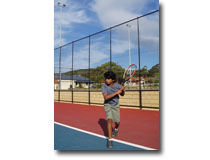Coaching Tip - February 2020
Self Umpiring for Tennis matches
The game of tennis is based on official rules that determine the structure of the scoring system used and hence the games played whether it is a casual hit, social or competitive match.
The Self Umpiring System for tennis matches has been used for many years during Junior and Senior matches at club level and in many tournaments and Social Tennis around the world.
ON- Court Rules for Tennis Matches played without Umpires
• All calls on your side of the net are your responsibility
i.e.you can’t ask an opponent for a let because you do not agree with their call.
If you have any doubt as to whether the ball is in or out you must give your opponent the benefit of the doubt and play the ball as in.
You should not play a let and replay the point.
• Any out call must be made instaneously
i.e. the call should be made before an opponent has hit the return or the return has gone out of play
Otherwise the rally continues
The call should be made both verbally and by using a hand signal so that your opponent is aware of the call.
• Do not ask spectators including parents before making a call
This can further confuse your impending line call decision as well as inviting this outside input in future calls
• If you call a ball out then realise your mistake you should correct your call immediately and award the point to your opponent.
• To avoid contraversy over the score the Server should call out the set score before starting a game and the game score before serving each point.
In this way the other player should agree to that score or discuss the score difference before the next point is played.
• If the score is in dispute then the refreree should be called by the player, a Parent or spectactor.
The referee will discuss the relevant points played in the game disputed and get to a point where the players agree and the match will resume from the agreed score.
• Footfaults are not allowed in tennis but they can’t be called by the opposing player at the other end of the court.
The opposing player can however call for the referee to stay courtside to observe things so as to see if in fact
Footfaults by this player are occurring.
• Similarly the referee can be called if there is any other dispute.
The referee will hopefully be able to resolve this dispute but will stay courtside to observe for a time.
The match will continue under the self Umpired system if things have been resolved but if not the referee may issue a warning to the offending player and appoint an adjudicator or Chair Umpire to oversee the remainder of the match.
Follow the guidelines for Self Umpired Tennis matches as outlined above and you will enjoy your tennis more.
Your opponents will also learn to respect you and as a result you will probably be well liked by your peers.
In fact you never know you might even be successful in your tennis matches
Contact me if you have comments or queries in regard to Self Umpiring in Tennis matches a much under publicised but important part of playing tennis
Tennis the game of a lifetime
Steve
Website www.stevejamestennis.com







